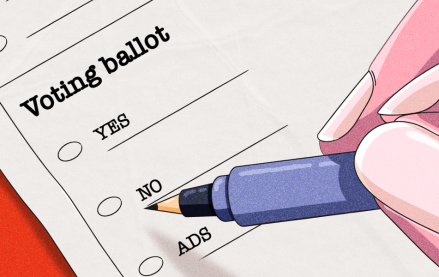Internet mysteries: Why don’t retargeting ads stop after I’ve bought the product?

It’s no secret that ad retargeting is a fairly blunt, if very effective, approach to customer conversion.
Many internet users have wondered: Why in the world am I still chased around Facebook and the internet with ads for a pair of sneakers I purchased weeks ago? It would seem all sides lose in that all-too-familiar scenario. The sneaker-purchaser gets annoyed, the advertiser is trying to sell something someone already bought, and the retargeting company is wasting an impression. You would think there would be an “I already friggin’ bought this!” button.
In this edition of unsolved mysteries, we examine why this still happens — and why we can’t tell the ad to stop following us around the internet.
Logistical roadblocks
Execs at ad tech companies Beeswax, MediaMath and Minodes all told Digiday that the technology exists to implement a button or digital database that allows users to indicate that they have already bought products displayed in the ads they’re seeing. But for some reason, the tech hasn’t been deployed at scale yet. “I can’t imagine what the tech hurdles would be other than [opt-out options] just might not have been developed yet,” said Stefan Persson, an independent digital marketing consultant.
While there may not be overt tech hurdles, Tim Wegner, Minodes CEO, said there are logistical issues that make implementing the technology difficult. “The problem is that each individual company that is doing retargeting has their own ecosystem,” he said. “If there were a common cookie or tracking tool shared among players, you could more easily” let users opt out.
Parker Noren, director of programmatic strategy and optimization at MediaMath, added, “The only hurdle operationally is getting all the teams [in retail, marketing, tech] to work together. And getting allowances to get all that data passed along the different teams.”
Cross-device issues
Beware: ad tech jargon ahead. Even if users were allowed to opt out of ads for products they have already purchased, they may be hit with those ads again on other devices. This is more likely to happen if users are being matched probabilistically than if they are being matched deterministically. Probabilistic matching involves inferring user identity from non-logged-in information such as IP addresses and browser settings, while deterministic matching involves tracking users across devices through personal logged-in accounts such as email or Facebook profiles. Deterministic data is more clear for tracking purposes, but it’s usually limited to Facebook and Google, which is why many marketers are left with probabilistic data when pairing users across devices.
Kate O’Loughlin, svp of media business at Tapad, said that without identity connection between screens “wasteful impressions will continue to be delivered in mobile,” regardless of future opt-out options. Beeswax CEO Ari Paparo said that users who block cookies might also be prevented from successfully opting out, even if such a feature existed.
No clear ROI
Retargeting for already-purchased products seems like it would suck for everyone. But it turns out it may not, Paparo said.
“If you change the messaging and give consumers an option [to opt out], there will be a positive or negative effect,” Paparo said. “And anything that might distract the user from the ad is considered a second priority.”
What Paparo is saying is that there may be unforeseen consequences of letting users opt out. If an opt-out feature were rolled out, perhaps users will shift some of their attention to the feature rather than strictly focusing on the ad itself. Users could also lie and say they have already purchased products they haven’t in an effort to avoid particular ads.
For companies to implement opt-out options, it will take clear incentives driven by encouraging data from A/B testing, Paparo said. None of the ad tech companies that replied to messages for this story were aware of A/B testing being done on the topic.
“In the end, advertisers just care about the total revenue from ads,” Paparo said. “They don’t care if they annoy a person like you or me. And while [opt-out options] sounds great, the number of consumers who utilize these services is vanishingly small.”
More in Media

Publishers revamp their newsletter offerings to engage audiences amid threat of AI and declining referral traffic
Publishers like Axios, Eater, the Guardian, theSkimm and Snopes are either growing or revamping their newsletter offerings to engage audiences as a wave of generative AI advancements increases the need for original content and referral traffic declines push publishers to find alternative ways to reach readers.

The Guardian US is starting its pursuit of political ad dollars
The Guardian US is entering the race for political ad dollars.

How much is Possible’s future in Michael Kassan’s hands?
Some people in the know at Possible said they see the conference taking a bite out of Cannes’ attendance, most acutely by U.S.-based marketers who could save money by staying on this side of the Atlantic.





